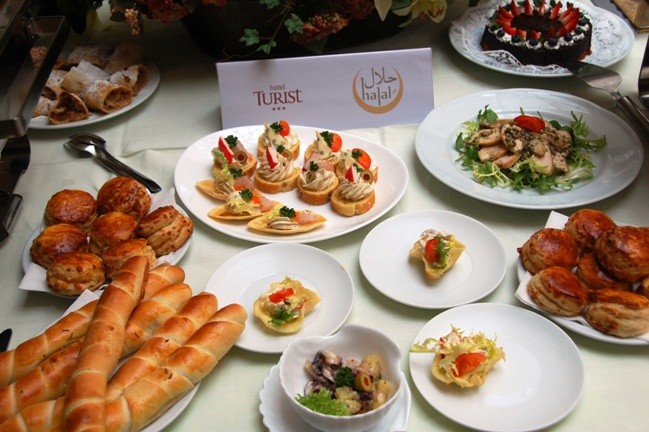 Photo Courtesy of: halal.hr
Photo Courtesy of: halal.hr
By: Sinke
A vacation is supposed to be a relaxing, fulfilling experience that boosts your mental batteries to equip you for everyday life. But differences between your culture and that of a destination can bring about unnecessary misunderstandings. Croatia, as a tourist country, is increasingly aware of this, and is continually trying its best to educate and promote understanding when it comes to this.
Regulations regarding food are a basic example of such issues. Whether they have a religious or ethical background, following regulations might be difficult in ignorant or insensitive surroundings. There are few things as complicated as explaining to a young waiter how your dish must be prepared, and which ingredients should be used. Or not used.
On the other hand, a tourist worker’s primary task is to ensure your satisfaction, guaranteeing your needs are met. Which means it’s his duty to safeguard your beliefs, even on vacation.
In this post, we will introduce you to the Islamic Halal selection in Croatia. Those who practice it will learn what to expect from the country’s various destinations, and those who don’t have the slightest idea what Halal is will learn more about it. We will also inform you about Islamic sites of worship, so visiting Croatia won’t pose a challenge to your religious worship.
Croatian Halal
Halal is an Arabic term which means allowed or permitted. In other words, “Halal” defines a list of things allowed for Muslim believers. This does not cover only food, but also things found in everyday life such as cosmetics or medicine. Younger generations are probably unaware that kebabs and falafels, found so often in western society, are actually Halal dishes. But they are just the beginning of Halal cuisine. It includes various oriental sauces and spices, as well as a large variety of chicken and lamb dishes (slaughtered in what is believed to be the proper way and in the name of Allah) while omitting pork and the meat of animals with claws.
Also, you do not have to be Muslim to stick to Halal when eating. As a matter of fact, recent studies in the UK have shown that, of 6 million Halal consumers, less than half are actually Muslim. It is a kitchen culture open for everyone, and practiced by anyone.
That being explained, what can one expect from Croatian Halal culture? Quite a lot, actually. Croatia has a long history with Islam, which gained the status of a recognized religion in 1916. Despite the country being almost universally Roman Catholic, Muslims are very active and perceive themselves more as an integral part of society than an isolated minority.
Also, Croatia has good relations with the Arab world (most notably with Turkey and Qatar). It marks an increasing number of visitors coming from the Middle East. Because of that, it has been becoming increasingly familiar with their specific culture and visitors’ needs.
Certified? Of course!
In 2010, the Islamic Community of Croatia founded The Center for Halal Quality Certification, which guards and promotes this specific code of food processing and ensures specific service facilities (ie: ablution and prayer rooms, direction of Qibla, separate wellness services, etc). As the name suggests, they give official certificates to hotels and resorts which satisfy the requirements of Halal Standard HRN BAS 1049:2010.
“Because of the institute’s dedicated work, we can call Croatia a regional leader in the availability of Halal cuisine,” tells us Aldin Dugonjic, a member of the Halal Quality Center Supervisory Board. “We also expect this trend to continue, as tourist offices are recognizing the need for such services.”
Notable wielders of this certificate include Hotels Aristos, The Esplanade and The Westinin Zagreb, Art in Slavonski Brod, Turist in Varazdin and Baska on the island of Krk. Halal values are no mystery in these places, and booking your stay in one of them means staying in an understanding environment, surrounded by staff whose duty it is to know and provide Halal quality to its guests.
Other notable certificate holders of similar nature include Zagreb’s Les Ponts restaurant and Spacva Hotel in Lipovac. The latter is a well-known resting point for people migrating between Western Europe and the Arab world, as it resides virtually half-way along their route. They also feature prayer chambers, so your religious needs will be fully met.
Additional info
For more information regarding Halal in Croatia, visit the official webpage of the Center for Halal Quality Certification in Croatia (the Arabic version is here) or visit them in person while in Zagreb, at Tomasiceva Street 12/2. Their telephone number is +385(1) 561 9062 and their e-mail is halal.hr@gmail.com.
Croatia has 15 Majlises, their locations being Dubrovnik, Gunja, Karlovac, Labin, Osijek,Porec, Pula, Rijeka, Sisak, Slavonski Brod, Split, Umag, Varazdin, Zadar and Zagreb. The country also has 3 Jama’at, located in Bogovolja, Maljevac and Vinkovc
The Islamic Centre of Zagreb (Gavellina Street 40) was constructed in 1987, designed by Sarajevo-based architects Dzemal Celic and Mirza Golos. It is a large complex featuring a 51-meter-high minaret and a medresa (Islamic religious high school). The Rijeka Islamic Center (located on Trg Grivica 6) is built on the slopes of Gornji Zamet and has a spectacular view of the Kvarner Bay. Its minaret rises to the north and reaches 17 meters in height.
Croatia is more than ready to grow its awareness of Halal diet and welcomes guests to help increase its knowledge. There is only one way for that to happen – come, visit and see what we have to offer.
Find your best dining options wherever you are in Croatia with Like Croatia’s Good Restaurants app, available on iTunes now!






